
JOURNAL OF FINANCIAL SERVICES RESEARCH
Scope & Guideline
Driving impactful research in finance and economics.
Introduction
Aims and Scopes
- Banking and Financial Regulation:
The journal consistently examines the evolving landscape of banking regulations, including the implications of policies on systemic risk, capital requirements, and the behavior of financial institutions. - FinTech and Innovation:
A core area of focus is the intersection of financial technology and traditional banking, exploring how innovations like neobanks and digital currencies impact financial systems and consumer behavior. - Risk Management and Performance:
Research often delves into the risk management practices of banks, the assessment of credit risk, and the performance implications of various financial strategies. - Consumer Behavior and Financial Markets:
The journal investigates how consumer behavior influences financial markets, including topics such as credit demand, loan pricing, and the adoption of new financial products. - Global Financial Stability:
A significant emphasis is placed on the analysis of global financial stability, particularly in relation to international banks, market dynamics, and economic shocks.
Trending and Emerging
- Impact of FinTech on Banking:
There is a growing interest in understanding how FinTech innovations, such as digital currencies and neobanks, are transforming traditional banking practices and systemic risk. - Central Bank Policies and Market Interventions:
Recent studies focus on the role of central banks in managing financial crises and their interventions in markets, providing insights into effective policy responses during episodes of market dysfunction. - Machine Learning and Data Analytics in Finance:
Emerging research increasingly applies machine learning techniques and advanced data analytics to assess risks, improve loan pricing, and enhance decision-making in banking. - Consumer Adoption of Financial Technologies:
The investigation of factors influencing consumer adoption of new financial technologies, including trust and usability, is gaining momentum as digital services become ubiquitous. - Sustainability and Ethical Banking Practices:
There is a rising emphasis on sustainability within banking practices and the ethical implications of financial services, reflecting broader societal concerns about environmental and social governance.
Declining or Waning
- Traditional Banking Models:
Research centered around traditional banking models and practices has seen a decline, as the rise of FinTech and alternative financial services reshapes the industry. - Static Risk Assessment Methods:
There is a noticeable waning in the use of static risk assessment methods, as dynamic and machine learning approaches gain traction in analyzing financial risks. - Regional Banking Studies:
Research focusing on regional banking issues has decreased, possibly due to a growing interest in global and cross-border banking dynamics. - Historical Analysis of Financial Crises:
While historical analysis remains important, the frequency of studies solely dedicated to past financial crises has diminished in favor of forward-looking analyses and predictive modeling. - Conventional Investment Strategies:
Research on conventional investment strategies is declining as new investment vehicles and behavioral finance approaches gain more attention.
Similar Journals
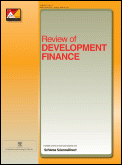
Review of Development Finance
Challenging Norms, Inspiring Solutions in Development FinanceReview of Development Finance is a peer-reviewed academic journal dedicated to the exploration and promotion of innovative research in the fields of development finance, economics, and econometrics. Published by AFRICAGROWTH INST in South Africa, this journal serves as a vital platform for scholars and practitioners to share their insights on the financial mechanisms that drive development, particularly in emerging economies. Despite its current impact factor reflecting its nascent status within the lower quartiles (Q4) of its categories, Review of Development Finance aspires to contribute to the understanding and progression of finance as a tool for accelerating development from 2011 to 2024 and beyond. It encourages submissions that challenge conventional wisdom and provide empirical evidence supporting the role of finance in attaining sustainable growth. By fostering an open exchange of ideas amongst researchers, professionals, and students, this journal aims to enhance the discourse surrounding development finance and inspire impactful solutions to global economic challenges.

Journal of Multinational Financial Management
Pioneering Insights in Economics and FinanceThe Journal of Multinational Financial Management, published by Elsevier, stands at the forefront of research in the fields of economics and finance, with a notable impact factor that underscores its significance in both academia and industry. With an ISSN of 1042-444X and E-ISSN of 1873-1309, this esteemed journal operates out of the Netherlands, specifically from its address at RADARWEG 29, 1043 NX AMSTERDAM. It has earned commendable rankings, including Q2 in Economics and Econometrics and Q1 in Finance for 2023, solidifying its reputation as a vital resource for researchers, professionals, and students interested in global financial management and the intricate dynamics of multinational corporations. Covering a wide scope of relevant topics from 1997 to 2024, the journal strives to foster advancements in financial theories and practices. While currently not an open access journal, it remains a critical repository for scholars aiming to explore and publish their work within a peer-reviewed platform that continues to make substantial contributions to the discipline.
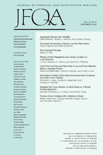
JOURNAL OF FINANCIAL AND QUANTITATIVE ANALYSIS
Illuminating Critical Issues in Financial AnalysisJOURNAL OF FINANCIAL AND QUANTITATIVE ANALYSIS, published by Cambridge University Press, is a premier peer-reviewed journal that has been at the forefront of the finance and economics fields since its inception in 1966. With a notable impact factor reflecting its Q1 status in Accounting, Economics and Econometrics, and Finance for 2023, the journal is recognized for its substantial contributions to both theoretical and empirical research. Researchers and practitioners alike benefit from its comprehensive scope, addressing critical issues in financial analysis and quantitative methods. Although the journal does not currently offer open access, it remains widely accessible through institutional subscriptions. The editorial team is committed to fostering rigorous academic discussions that shape the future of finance and economics, making it an essential resource for academics, students, and industry professionals seeking to deepen their understanding of these vital disciplines. For more than five decades, this journal has continued to be an indispensable platform for disseminating influential research, thus solidifying its role as an essential cornerstone in the financial and quantitative analysis community.
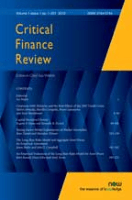
Critical Finance Review
Advancing finance scholarship through critical inquiry.Critical Finance Review is a premier academic journal dedicated to advancing the field of finance through the publication of high-quality research that spans various dimensions of the discipline. Published by NOW PUBLISHERS INC, this journal has quickly established itself as a leading source of innovative finance scholarship, achieving a notable Q1 classification in the 2023 finance category. Operating under a rigorous peer-review process, the journal ensures the academic integrity and relevance of its content, which attracts contributions from both emerging and established scholars. With an ISSN of 2164-5744 and E-ISSN 2164-5760, it is accessible to a global audience, though it operates under traditional access models. The journal welcomes a diverse range of topics including, but not limited to, risk management, financial markets, and quantitative finance, making it an essential resource for researchers, professionals, and students who are keen to explore the complexities of financial systems and develop new insights in the ever-evolving landscape of finance. Based in the United States, Critical Finance Review holds a significant position within the academic community, fostering a collaborative environment that encourages innovative thinking and practical applications of financial theories.
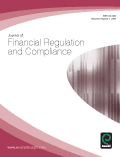
Journal of Financial Regulation and Compliance
Navigating the Complexities of Finance and ComplianceThe Journal of Financial Regulation and Compliance, published by Emerald Group Publishing Ltd, serves as a vital resource for researchers, professionals, and students in the fields of finance, strategy, and management. With an ISSN of 1358-1988 and E-ISSN 1740-0279, this esteemed journal has been at the forefront of scholarly dialogue since its inception in 1996, and it will continue to publish until 2024. As a recognized entity in the academic community, it holds a Q3 category ranking in both Finance and Strategy and Management according to the 2023 metrics. The journal is indexed in Scopus, with a respectable rank of #278 out of 478 in its category, placing it in the 41st percentile, further underscoring its contribution to relevant academic discourse. Although it does not currently offer Open Access, it produces high-quality, peer-reviewed content that addresses the latest developments and challenges in financial regulation and compliance. This journal is essential for anyone looking to engage with contemporary issues and theories shaping the financial landscape.

Financial Internet Quarterly
Empowering Research in the Financial Internet SphereFinancial Internet Quarterly is an esteemed journal published by WALTER DE GRUYTER GMBH, specializing in the dynamic intersection of finance and digital technology. Since its inception in 2015 as an Open Access journal, it has aimed to disseminate pioneering research, innovative methodologies, and critical analyses pertaining to the financial internet landscape. By addressing contemporary issues in digital finance, cybersecurity, fintech solutions, and blockchain applications, the journal seeks to provide invaluable insights for researchers, policymakers, and practitioners alike. Located in Berlin, Germany, Financial Internet Quarterly fosters collaboration among scholars and industry leaders to advance knowledge in this rapidly evolving field, making it an essential resource for anyone interested in the future of finance.
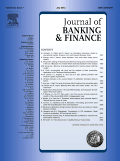
JOURNAL OF BANKING & FINANCE
Navigating the Complexities of Finance with ExpertiseWelcome to the Journal of Banking & Finance, a premier publication in the fields of finance and economics, expertly published by Elsevier. With its esteemed Q1 ranking in both the Economics and Econometrics and Finance categories for 2023, this journal frequently garners significant attention from researchers, professionals, and academics alike. Established in 1977, it has become a crucial resource for the latest research and advancements in banking and financial services, influencing policies and practices on a global scale. The journal's commitment to high-quality, peer-reviewed content ensures that it not only contributes to academic discourse but also drives real-world financial innovation. As part of the respected Elsevier publishing collection, the journal's rigorous standards and comprehensive analysis serve as indispensable tools for those seeking to understand and navigate the complexities of the financial landscape. Located in the Netherlands, the Journal of Banking & Finance continues to play a vital role in shaping the future of financial research through its impactful insights and research contributions.

International Journal of Financial Studies
Championing accessible research in the world of finance.The International Journal of Financial Studies is a premier publication dedicated to advancing the field of finance through open-access research. Published by MDPI based in Switzerland, this journal offers researchers, professionals, and students a platform to disseminate their findings in an accessible format since its establishment in 2013. With its ISSN of 2227-7072 and a commendable impact reflected in its Q2 ranking in finance, it occupies an influential position among finance-related journals, as evidenced by its 65th percentile rank in Scopus. The journal encompasses a wide array of topics in finance, making it essential reading for those seeking to stay abreast of current research trends and methodologies. As an open-access journal, all articles are freely available, significantly enhancing the visibility and reach of published studies, which is crucial for fostering collaboration and innovation within the global financial community. Published continuously until 2024, the International Journal of Financial Studies is not just a source of knowledge; it is a critical contributor to the progression of financial scholarship.
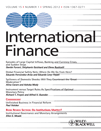
International Finance
Empowering decision-makers with rigorous financial research.International Finance is a prestigious academic journal published by WILEY, dedicated to the exploration and advancement of theories and practices in the realms of finance, development, and geography. With a strong emphasis on empirical and theoretical research, this journal provides a crucial platform for researchers, professionals, and students to disseminate cutting-edge findings that shape our understanding of the financial landscape on a global scale. Holding an impressive impact factor and categorized in the Q2 quartile across multiple disciplines, including Development, Finance, and Geography, the journal has established itself as a significant contributor to scholarly discourse. Since its inception in 1998 and spanning until 2024, International Finance offers a comprehensive overview of current trends and challenges faced in financial contexts, enhancing the decision-making processes within academia and industry alike. Although the journal is not open access, its rigorous peer-review process guarantees high-quality content that is indispensable for anyone engaged in the diverse fields intersecting with finance.
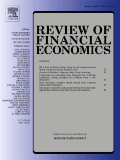
Review of Financial Economics
Unraveling Complexities in Financial EconomicsReview of Financial Economics, published by WILEY, stands as a prominent peer-reviewed journal in the fields of economics and finance. Established in 1994, this journal provides a platform for rigorous research and thoughtful discourse, contributing to the advancement of knowledge in financial theory and its applications. With an HIndex indicative of its citation impact, it ranks in the Q3 quartile for both Economics and Econometrics, as well as Finance, based on the 2023 categorization, underscoring its role in the academic community. Although it does not currently offer Open Access, the journal remains accessible to a wide audience through institutional subscriptions. Researchers, professionals, and students are encouraged to engage with its insightful articles that address contemporary issues and advancements within financial economics, fostering a deeper understanding of the complex interplay between economic systems and financial markets.